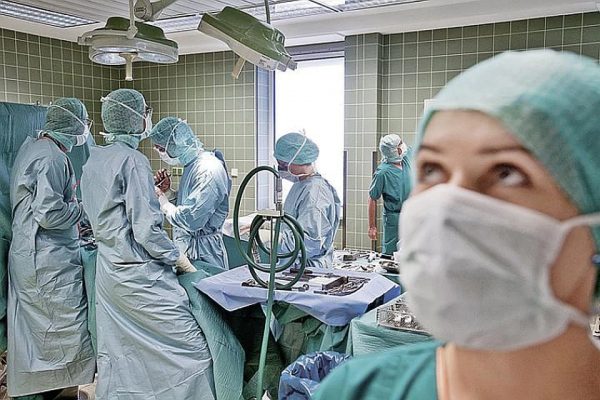I received a note from a podcast listener, who heard me mention in passing on Everyday Orthodox, that my daughter received a liver transplant in 2010. I was talking about the strange moment when we received the phone call, hearing that they had an eleventh hour liver for the very sick little baby lying in a hospital bed in front of me. That moment held so much joy and relief, and so much fear and concern.
This listener, on the other side of the world, has a husband and children, and a condition that may well carry her toward transplant and she is struggling with it, spiritually. She wonders if it is right to intervene to this extent, and I know what she means, and back in 2010, I was thinking about these questions a lot.
For years I have observed that, in our culture, we want to be young and alive forever. We don’t want to age, so we have cosmetic surgeries and knee surgeries and whatever it takes to be 50 year olds who look and move like we’re 20. We don’t like funerals but prefer Celebrations of Life. We seem to hate mortality, to fear death, and to refuse to look it square in the eye, so we push and push to extend life, to an unhealthy extent. I have thought that we would perhaps be spiritually healthier if we could release our grip on life and accept death more readily. All of this makes sense to me.
It’s an interesting philosophical exercise, until one day you or your beloved child require a life-saving intervention that is really modern and technologically innovative, and suddenly that philosophy slaps you in the face and you have to decide what to do about it.
While our culture is unhealthily death-avoidant, it is also true that as Christians, we declare that life is a gift from God, and that it is His to decide when it should end.
When I was making this choice, my daughter was an infant, and having already buried one child, I knew that the evil one is able to twist things in our heads, that he tortures us with the choices we make, and that he would torture me about making a choice to avoid life-saving medical treatment for her. Most importantly though, I knew that God entrusted me to be the steward of her life, and as such, I would surely do what I could to protect and preserve that life.
I suppose that we are the stewards of our own lives as well. It’s not “my life” but a life given to me by God, and which will end when God so chooses. We are called to respect and preserve life, and also to have the humility to allow God to decide when that life ends.
We hear about amazing medical advances, but in practice, it’s not magic. When my third was born with a cleft lip and palate, everyone happily declared that, “doctors do such wonderful things now!” They do. She looks great and her mouth and nose now function well, but it wasn’t easy. She has endured surgeries and procedures, and her first 18 years have been marked by the constant struggle to correct this birth defect. Yes, medicine has made wonderful advances, but it’s not Star Trek yet — we cannot heal people with our scanners. It’s a difficult process.
Our medical system is not so advanced that God cannot intervene; we have not overcome mortality or robbed Him of His power. We never will. Many people will take advantage of all that medicine offers but will not live as long as they’d like. God will take us at any point along that path. In no way are we actually able to overcome what God desires for us with our wonderful medical devices and techniques. And the processes by which life is preserved are not easy or painless. It’s a struggle to receive a transplant — and perhaps a humbling one, and a beneficial one. Perhaps God allows us to need such a thing, to experience such a thing, to carry such a cross, for our own salvation.
In the end, there is a balance to be worked out. Where does our system go too far? At this point, I think that the Church has rightly said that any medical intervention that benefits me at the cost of another is too much. One must never extend one’s own life at the cost of another. Thank God, our medical systems generally agree with this basic ethic, and our transplant organizations are very careful not to allow any organs taken by force or at the expense of the donor (i.e. the donor must be already dead).
Transplant is not the easy way out. It’s difficult, and it’s never quite “final”. Even once the patient is on the “list”, they are a person actively progressing toward organ failure, living in the suspended hope of receiving an organ. When an organ comes, the process is fraught with uncertainty and mortal danger at every turn: will it be a match? will my blood tests be good enough to proceed? will I suddenly spike a fever and lose my chance? At any moment, one small thing can go wrong, and the patient will die. In my experience, many of us pray all the way through it, clinging to God and holding our breath.
When my daughter was being rolled in for surgery, the hallways were filled with jubilant, smiling nurses and hospital staff. They were surprised and delighted that she made it; it really had looked bleak, and here was a bright and glorious reprieve. But as the mother of this child, the stone in the pit of my stomach told me that a surgeon was about to cut her open and embark on a six-hour surgery with complications and difficulties of its own. Transplant is not for sissies, and is no permanent fix, but brings its own new host of concerns. It’s a cross too, as is the illness that makes it necessary. In the end, God knows what our medicine can do, and He allows it. He has created each of us in a specific era of history — some in an era where a lack of treatment options was their cross, others in an era where perhaps the options themselves become crosses and challenges. Perhaps the transplant itself is the struggle He wants us to endure. Perhaps He has work for us at that hospital, and He sends us to witness to someone He loves there. We don’t know. Humility may be recognizing that we cannot know what He has in mind, really, and that we can only continue to walk toward the light and to embrace life and all of His gifts.
I think that the real spiritual challenge is to walk forward through all of these processes with love and without fear, knowing that God is in charge and that we can trust Him throughout. We have to make peace with death. God will take us when He takes us, and that could be at any moment along the way. (Indeed, I might be in liver failure but then be hit by a bus — we just never know.) We have to find a way to face death without fearing it, solid in the conviction that eternal life is so much more important than earthly life. When we approach these tremendous medical decisions, I suppose we should strive to be at peace regardless of the outcome — ready to carry a cross or to lay it all down, as He sees fit.

















